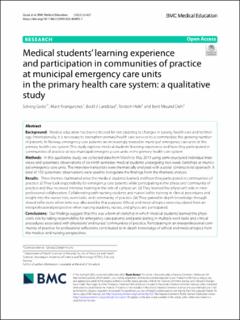| dc.contributor.author | Giske, Solveig | |
| dc.contributor.author | Kvangarsnes, Marit | |
| dc.contributor.author | Landstad, Bodil | |
| dc.contributor.author | Hole, Torstein | |
| dc.contributor.author | Dahl, Berit Misund | |
| dc.date.accessioned | 2023-01-30T13:59:34Z | |
| dc.date.available | 2023-01-30T13:59:34Z | |
| dc.date.created | 2022-06-17T12:36:51Z | |
| dc.date.issued | 2022 | |
| dc.identifier.citation | BMC Medical Education. 2022, 22 (1), 1-13. | en_US |
| dc.identifier.issn | 1472-6920 | |
| dc.identifier.uri | https://hdl.handle.net/11250/3047202 | |
| dc.description.abstract | Background
Medical education has been criticised for not adapting to changes in society, health care and technology. Internationally, it is necessary to strengthen primary health care services to accommodate the growing number of patients. In Norway, emergency care patients are increasingly treated in municipal emergency care units in the primary health care system. This study explores medical students’ learning experience and how they participated in communities of practice at two municipal emergency care units in the primary health care system.
Methods
In this qualitative study, we collected data from March to May 2019 using semi-structured individual interviews and systematic observations of six ninth-semester medical students undergoing two-week clerkships at municipal emergency care units. The interview transcripts were thematically analysed with a social constructivist approach. A total of 102 systematic observations were used to triangulate the findings from the thematic analysis.
Results
Three themes illuminated what the medical students learned and how they participated in communities of practice: (i) They took responsibility for emergency care patients while participating in the physicians’ community of practice and thus received intensive training in the role of a physician. (ii) They learned the physician’s role in interprofessional collaboration. Collaborating with nursing students and nurses led to training in clinical procedures and insight into the nurses’ role, work tasks, and community of practice. (iii) They gained in-depth knowledge through shared reflections when time was allocated for that purpose. Ethical and medical topics were elucidated from an interprofessional perspective when nursing students, nurses, and physicians participated.
Conclusions
Our findings suggest that this was a form of clerkship in which medical students learned the physician’s role by taking responsibility for emergency care patients and participating in multiple work tasks and clinical procedures associated with physicians’ and nurses’ communities of practice. Participating in an interprofessional community of practice for professional reflections contributed to in-depth knowledge of ethical and medical topics from the medical and nursing perspectives. | en_US |
| dc.language.iso | eng | en_US |
| dc.publisher | BMC | en_US |
| dc.relation.uri | https://bmcmededuc.biomedcentral.com/articles/10.1186/s12909-022-03492-7 | |
| dc.rights | Navngivelse 4.0 Internasjonal | * |
| dc.rights.uri | http://creativecommons.org/licenses/by/4.0/deed.no | * |
| dc.title | Medical students’ learning experience and participation in communities of practice at municipal emergency care units in the primary health care system: a qualitative study | en_US |
| dc.title.alternative | Medical students’ learning experience and participation in communities of practice at municipal emergency care units in the primary health care system: a qualitative study | en_US |
| dc.type | Peer reviewed | en_US |
| dc.type | Journal article | en_US |
| dc.description.version | publishedVersion | en_US |
| dc.source.pagenumber | 1-13 | en_US |
| dc.source.volume | 22 | en_US |
| dc.source.journal | BMC Medical Education | en_US |
| dc.source.issue | 1 | en_US |
| dc.identifier.doi | 10.1186/s12909-022-03492-7 | |
| dc.identifier.cristin | 2032900 | |
| cristin.ispublished | true | |
| cristin.fulltext | original | |
| cristin.qualitycode | 1 | |

